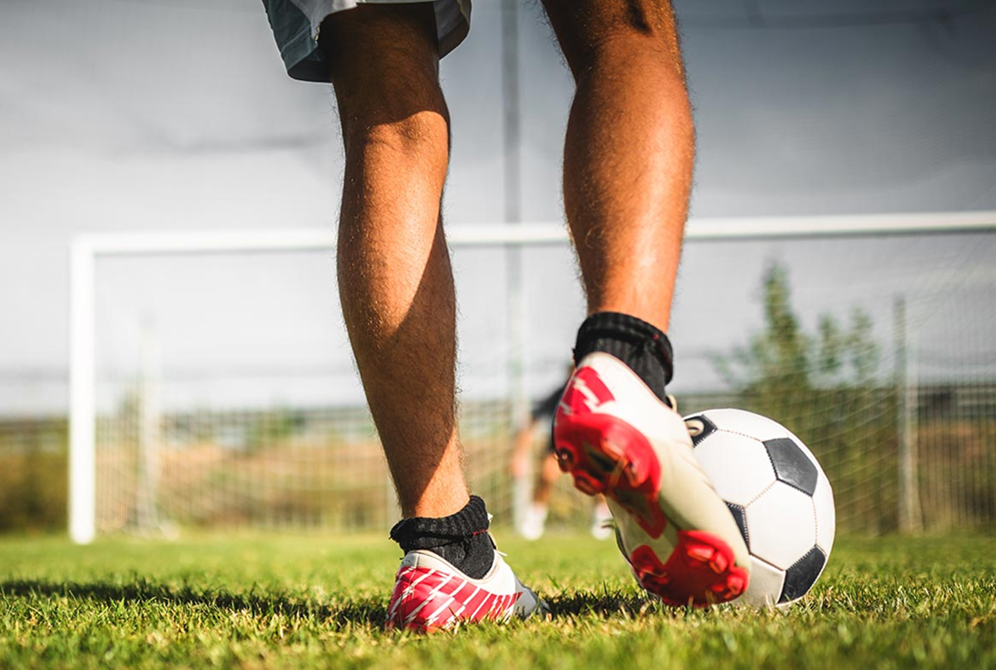
How Acupuncture Can Help Soothe Pregame Anxiety
May 7, 2024
The topic of mental health in sports has been mostly ignored until fairly recently. But thanks to several high-profile athletes’ willingness to open up about their struggles, the topic is no longer quite so taboo.
 “Athletes at all levels are realizing the importance of their overall mental health, mental preparation before an event and mental recovery afterward,” says Thomas R. Betts, DAOM, LAc, a sports medicine acupuncturist at Henry Ford Health. “Having your mind in the right place pays big dividends in terms of sports performance.”
“Athletes at all levels are realizing the importance of their overall mental health, mental preparation before an event and mental recovery afterward,” says Thomas R. Betts, DAOM, LAc, a sports medicine acupuncturist at Henry Ford Health. “Having your mind in the right place pays big dividends in terms of sports performance.”
One of the many tools athletes are using to get their minds healthy is acupuncture. It may be an ancient Chinese practice, but it can be useful to help improve the mental health of modern athletes.
What Is Acupuncture?
Acupuncture is a healing technique that has been used in traditional Chinese medicine for thousands of years. Acupuncture practitioners (acupuncturists) insert very fine, thin needles into the skin at various points on the body, depending on what condition they’re treating.
According to traditional Chinese medicine, the insertion points for the needles correspond to specific internal organs or energy channels in the body. “The philosophy behind traditional Chinese medicine is that acupuncture works by manipulating the flow of blood and energy to create balance and harmony in the body,” says Betts.
From a Western medicine perspective, acupuncture works by stimulating the central nervous system and by having some direct effect on the tissues in which needles are placed. Acupuncture also has a balancing effect on hormones within the body. It works well with other treatments for anxiety such as sports psychology, massage therapy, guided visualization and meditation.
How Can Acupuncture Improve Sports Performance?
Acupuncture has long been used to help people relax, reduce stress and cope with anxiety. And it can have that effect even when the acupuncturist is treating a physical problem. “Even when I’m treating an athlete for a sports injury, when I ask how they feel post treatment the overwhelming response I hear is ‘I feel so relaxed,’” says Betts.
This is why acupuncture seems like a natural fit for helping athletes of all levels cope with performance anxiety, pregame jitters or other competition-related fears. “Reducing stress helps athletes perform better,” says Betts. “And more and more athletes are realizing that taking care of their mental health and using tools to stay mentally focused can really enhance their performance.”
When Should Athletes Try Acupuncture?
Since an acupuncture session can leave you feeling super calm and relaxed, you don’t want to try it for the first time right before a game or competition. “The timing is important,” says Betts. “You want the athlete to feel motivated to compete, not totally Zenned out.”
The best approach is to schedule a series of acupuncture sessions in the weeks leading up to a big game, competition or race. Betts says he typically recommends athletes come in twice a week for three weeks to get started. “It’s not about treating their anxiety in the moments before a game,” he says. “It’s about establishing a baseline of calm that they can carry with them into the competition.”
While there’s still some stigma surrounding athletes and mental health, Betts sees the popularity of acupuncture as one sign of a shift. “I think we’re trending in the right direction for mental health,” he says. “Athletes are starting to understand that if they want longevity and success in their sport, they need to take care of their mental and emotional health—not just the physical.”
Reviewed by Thomas Betts, DOAM, RAc, a certified sports acupuncturist who sees patients at the Henry Ford Center for Athletic Medicine in Detroit.
To find a sports medicine provider at Henry Ford Health, visit henryford.com/athletes or call 313-651-1969.

How Exercise Can Help Reduce Your Anxiety
January 6, 2022
Stress and anxiety at any level can be hard to manage. If you’re searching for relief, try turning to exercise. Even the smallest amount of physical activity can make a significant difference and reduce stress.
“Anxiety affects our minds and bodies. Exercise can serve as a natural antidepressant, boosting our mood at the same time it improves our health,” said Megan LaDrigue, ATC CSCS, an athletic trainer at Henry Ford Health System. “You don’t need to join a gym to exercise. The world is full of opportunities to be more active. You can add in short exercise sessions throughout the day to recharge your mood and energy.”
How Anxiety Impacts Your Health
If not addressed, anxiety can impact your mental and physical health. “Anxiety causes an imbalance in the chemicals and hormones that support our brain, immune system, digestive health and sleep,” said LaDrigue.
Chronic stress can lower our feel-good hormones – serotonin, dopamine and epinephrine. At the same time, the stress hormone cortisol increases when we’re under pressure or anxious. As a result of these shifts, you may experience:
► Trouble concentrating and loss of productivity at work or school
► Irritability and moodiness
► Difficulty sleeping
► Weight gain and digestive problems
► High blood pressure and increased risk for other diseases
How Exercise Can Break The Stress Cycle
“By adding exercise into your daily routine, you can begin to manage anxiety and improve your overall health,” said Ladrigue. Exercise offers many benefits, including:
► Shifting your focus: Focusing on your physical activity is a chance to take a mental break from daily tasks and recharge.
► Improving mood and confidence: When you exercise, your heart contracts more frequently, increasing blood flow to the brain and triggering changes in those feel-good chemicals. These changes improve mood and confidence. Over time, exercise can also help build resilience by increasing your ability to tolerate stress.
► Enhancing concentration and productivity: Exercise activates the areas in the brain that control how we think and act. For example, physical activity can improve your ability to plan, organize and monitor behavior and tasks.
► Improving sleep: Fatigue can increase feelings of stress and anxiety, which increase your risk for insomnia or poor sleep. Exercise improves your ability to get the quality, restorative sleep that you need to recharge your mind and body.
3 Steps To Starting An Anxiety-Fighting Exercise Routine
The U.S. Department of Health and Human Services recommends adults get 150 minutes of moderate exercise per week. “But you don’t need to do all of that exercise at once. If you’re just getting started, gradually build exercise into your daily routine to create a healthy habit,” LaDrigue said.
Ladrigue recommends these three steps to build an anxiety-busting fitness routine:
- Make it fun: Whether it’s walking or weightlifting, if exercise doesn’t inspire you and make you feel good, it won’t help you manage anxiety. If being social helps motivate you, find a workout buddy and encourage each other to keep moving. Explore new types of exercise by taking an online or in-person fitness class.
- Create a flexible schedule: If finding time in your day to exercise adds to your stress, try working in shorter activity periods. Do some stretches while you’re waiting for the coffee to brew. Take a walk during lunch or while you’re talking on the phone. Use the stairs instead of the elevator. Park your car farther away from your destination and walk the extra distance.
- Set goals: Start by setting short-term goals for your fitness routine. Record your progress to stay focused and motivated. As exercise becomes a daily habit, set longer-term goals. For example, try a community walk or run, join a hiking club or participate in a local sports league.
Build An Effective Workout Plan
If you’re new to exercise or have an underlying health condition, check with your primary care physician before starting a fitness routine. Had an injury in the past? See a physical therapist or sports medicine provider to avoid future injuries.
If you’ve taken a break from exercise or are exercising for the first time, start slowly. Over time, you can gradually increase the time and intensity of your workout to meet your goals.
When picking an exercise program, Ladrigue suggests including these elements:
► Warm up: Start with five minutes of activity like jumping jacks or running in place to increase the blood flow to your muscles.
► Dynamic stretching: Gently move through small or large ranges of motion to elongate the muscle tissue. For example, you can try arm circles or walking quad stretches to get your muscles warmed up.
► Strength training: If you’re new to strength training, start with light weights. You can start with three sets of 10 repetitions for each muscle group. Combine sets for a muscle group on the front of the body immediately followed with a set for a muscle group on the back of the body, like biceps and triceps. This approach is called “super-setting.” It keeps your heart rate elevated while giving the working muscle group time to recover. It also increases your metabolic burn, the rate at which you burn calories during exercise.
► Aerobic activity: Choose from a variety of activities, like walking, running, biking, swimming or dancing. Light- to moderate-intensity exercise can help you recover at the end of a strength training workout while increasing oxygen and blood flow to the working tissues.
► Cool down: Hold stretches for 20 to 30 seconds to elongate the muscle tissue used in your workout. This type of stretching helps prevent or minimize soreness.
“While starting a new habit like exercise can seem daunting, stay positive. Feel empowered – you’re taking steps that will improve your overall mental and physical health for years to come,” said LaDrigue.
To find a primary care or sports medicine specialist at Henry Ford, visit henryford.com or call 1-800-436-7936.
Megan LaDrigue is an athletic trainer who works with the Henry Ford Sports Medicine Sports Performance Program.


